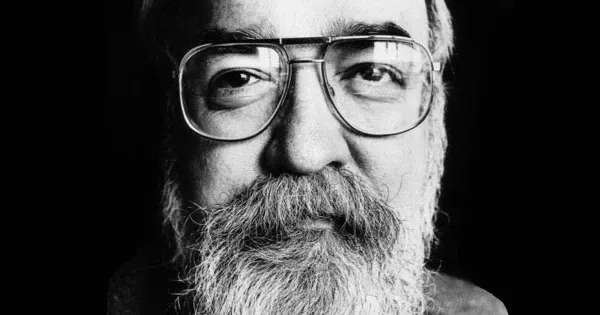“No matter how smart you are, you’re smarter if you take the easy ways when they are available.”
— Daniel C. Dennett, Intuition Pumps and Other Tools for Thinking, 2013.
Παραθέτω ολόκληρη την ανυπόγραφη νεκρολογία του Ντάνιελ Ντένετ, όπως δημοσιεύτηκε στο Βήμα της Κυριακής (28/4/24). Το αγγλικό υπογραμμισμένο κείμενο είναι αποσπάσματα από τη νεκρολογία του Ντένετ, όπως δημοσιεύτηκε στους New York Times (22/4/24). Τα αποσπάσματα, όπως θα παρατηρήσετε, υπήρξαν πηγή έμπνευσης για τον συντάκτη.
«”Κάθε είδους αντίληψη, κάθε είδους σκέψη και διανοητική δραστηριότητα επιτυγχάνονται στο μυαλό μας μέσω παράλληλων διαδικασιών ερμηνείας και διερεύνησης των δεδομένων των αισθήσεων σε πολλούς διαύλους ταυτόχρονα. Η πληροφορία που εισέρχεται στο νευρικό σύστημα βρίσκεται υπό συνεχή αναθεώρηση”».
“All varieties of perception — indeed all varieties of thought or mental activity — are accomplished in the brain by parallel, multitrack processes of interpretation and elaboration of sensory inputs,” he wrote. “Information entering the nervous system is under continuous ‘editorial revision.’”
«Για τον διαπρεπή φιλόσοφο Ντάνιελ Ντένετ ο ανθρώπινος νους δεν ήταν παρά το αντίστοιχο ενός υπερυπολογιστή που επιτελεί μια σειρά από αλγοριθμικές λειτουργίες».
Mr. Dennett had expounded his belief that consciousness could be explained only by an understanding of the physiology of the brain, which he viewed as a kind of supercomputer.
«Ο καθηγητής του Πανεπιστημίου Ταφτς, συγγραφέας περισσότερων από 20 βιβλίων και χαρισματικός αφηγητής διακρινόταν τόσο για τις προκλητικές του θέσεις όσο και για την επίμονη υπεράσπισή τους».
Beyond his more than 20 books and scores of essays, his writings even made their way into the theater and onto the concert stage.
But Mr. Dennett, who never shirked controversy, often crossed swords with other famed scholars and thinkers.
«Διάσημη υπήρξε η χρόνια διαμάχη του με τον επιφανή εξελικτικό βιολόγο και παλαιοντολόγο Στίβεν Τζέι Γκουλντ, ο οποίος εφιστούσε την προσοχή ως προς το γεγονός ότι στην εξέλιξη παίζουν ρόλο και άλλοι παράγοντες πλην της φυσικής επιλογής, κάτι αδιανόητο για τον Ντένετ που παρέμεινε πεπεισμένος ότι τα φυσικά και συμπεριφοριστικά χαρακτηριστικά εξελίσσονται μέσω της θετικής συμβολής τους στην επιβίωση ή την αναπαραγωγή των ειδών».
Critics, like Mr. Gould, cautioned that while natural selection was important, evolution would also have to be explained by random genetic mutations that were neutral or even somewhat damaging to organisms, but that had become fixed in a population. [...] Mr. Dennett irked some scientists by asserting that natural selection alone determined evolution. He was especially disdainful of the eminent paleontologist Stephen Jay Gould, whose ideas on other factors of evolution were summarily dismissed by Mr. Dennett as “goulding.”
«Εξίσου αδιανόητη του ήταν και η πίστη στη θρησκεία. Δηλωμένος άθεος, έλεγε στους “New York Times” πως “δεν υπάρχει ευγενικός τρόπος να πεις σε κάποιον ότι έχει αφιερώσει τη ζωή του σε μια ψευδαίσθηση».
An outspoken atheist, he at times seemed to denigrate religion. “There’s simply no polite way to tell people they’ve dedicated their lives to an illusion,” he said in a 2013 interview with The New York Times.
«Ψευδαίσθηση θεωρούσε και την ελεύθερη βούληση: οι μελέτες του για τη διαδικασία λήψης αποφάσεων τον είχαν κάνει να φτάσει στο συμπέρασμα ότι η τυχαιότητα μετρούσε περισσότερο σε σχέση με τα κίνητρα, τα πάθη, τη λογική ή τις αξίες. Ωστόσο, εδώ έβαζε έναν αστερίσκο: η φαντασία της ελεύθερης βούλησης ήταν απαραίτητη για την ανθρώπινη κοινωνία προκειμένου να γίνουν αποδεκτοί οι κανόνες που τη ρυθμίζουν».
For Mr. Dennett, random chance played a greater role in decision-making than did motives, passions, reasoning, character or values. Free will is a fantasy, but a necessary one to gain people’s acceptance of rules that govern society, he said.
Mr. Dennett asserted that multiple decisions resulted in a moral choice and that these prior, random deliberations contributed more to the way an individual acted than did the ultimate moral decision itself.
Still, he asserted, free will was a necessary illusion to maintain a stable, functioning society.
«Φιλόνικος όσο και διεισδυτικός στοχαστής, ο Ντάνιελ Ντένετ δεν θα πρέπει να γίνεται αντιληπτός ως επαγγελματίας καβγατζής: εξέφρασε παραστατικά την αυξανόμενη αντιπαράθεση μεταξύ επιστήμης και φιλοσοφίας στο φως των νεότερων ερευνών της νευροεπιστήμης και της βιολογίας στις αρχές του 21ου αιώνα».
But Mr. Dennett, who never shirked controversy, often crossed swords with other famed scholars and thinkers.
Not surprisingly, Mr. Dennett’s writings could elicit strong criticism as well — to which he sometimes reacted with fury.
Underlying the increasingly acrimonious debate between the scholars was a natural friction in the scientific and philosophical communities over which side merited more credibility on the subject of evolution.

